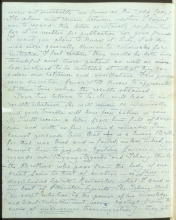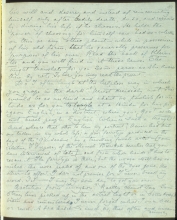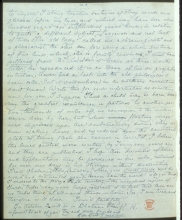worn out mortality we know as the "Old Lady." The above must remain between us two. I expect you to regard this letter as strictly confidential for it is neither for publication nor your friends. I want you alone to know it. Only, if all this was more generally known to candidates for initiation, I feel certain they would be both more thankful and more patient as well as less inclined to be irritated at what they consider our reticence and vacillations. Few possess your discretion; fewer still know to appreciate at their true value the results obtained. . . . Your two letters to S.M. will lead to no result whatever. He will remain as immovable and your trouble will have been taken in vain. You will receive a letter from him full of suspicion and with no few unkind remarks. You cannot persuade him that + is a living Brother for that was tried and — failed; unless, indeed, you convert him to popular exoteric Lamaism; which regards our "Byang-tzyoobs" and "Tchang-chubs" — the Brothers who pass from the body of one great Lama to that of another — as Lhas or disembodied Spirits. Remember what I said in my last of Planetary Spirits. The Tchang-chub (an adept who has, by the power of his knowledge and soul enlightenment, become exempt from the curse Of UNCONSCIOUS transmigration) — may, at
Letter №20
Letter №20 (ML-49)
Mahatma K.H. - A.P. Sinnett
5 August, 1881
Covers - 1. Pages - 12.
Page 11
his will and desire, and instead of reincarnating himself only after bodily death, do so, and repeatedly — during his life if he chooses. He holds the power of choosing for himself new bodies — whether on this or any other planet — while in possession of his old form, that he generally preserves for purposes of his own. Read the book of Khiu-tee and you will find in it these laws. She might translate for you some paras, as she knows them by rote. To her you may read the present.
Do I often laugh at "the helpless way in which you grope in the dark?" Most decidedly not. That would be as unkind and about as foolish for me to do as for you to laugh at a Hindu for his pidgin English, in a district, where your Government will not teach people English. Whence such a thought? And whence that other to have my portrait? Never had but one taken, in my whole life; a poor ferrotype produced in the days of the "Gaudeamus" by a travelling female artist — (some relative, I suppose, of the Munich Beer-Hall beauties that you have interviewed of late) — and from whose hands I had to rescue it. The ferrotype is there, but the image itself has vanished: the nose peeled off and one of the eyes gone. No other to offer. I dare not promise for I never break my word. Yet — I may try — some day to get you one.
Quotation from Tennyson? Really cannot say. Some stray lines picked up in the astral light or in somebody's brain and remembered, I never forget what I once see or read. A bad habit. So much so, that often and unconsciously
Khiu-tee: according to David Reigle, the Kiu-Te (Tib. rGyud-sde) is a section of the "Kangyur" (Tib. bKa'-'gyur), a collection of Tibetan Buddhist sacred literature divided into two kinds, "mDo-sde" (sutras) and "rGyud-sde" (tantras).
ferrotype is a tintype, or a positive photograph made by a collodion process on a thin iron plate having a darkened surface.
"Gaudeamus" probably refer to "Gaudeamus Igitur" ("So Let Us Rejoice"), a popular academic song in many Western countries, mainly used at university graduation ceremonies. The current Latin lyrics were published in 1781.
Page 12
to myself I string together sentences of stray words and phrases, before my eyes and which may have been used hundred years ago or will be hundred years hence, in relation to quite a different subject. Laziness and real lack of time. The "Old Lady" called me a "brain pirate" and a plagiarist, the other day for using a whole sentence of five lines, which, she is firmly convinced, I must have pilfered from Dr. Wilder's brain as three months later, he reproduced it in an essay of his on prophetic intuition. Never had a look into the old philosopher's brain cells. Got it somewhere in a northern current — don't know. Write this for your information as something new for you, I suppose. Thus a child may be born bearing the greatest resemblance and features to another person, thousands of miles off, no connexion to the mother, never seen by her, but whose floating image was impressed upon her soul-memory, during sleep or even waking hours, and reproduced upon the sensitized plate of living flesh she carries in her. Yet, I believe, the lines quoted, were written by Tennyson years ago, and they are published. I hope these disjointed reflections and explanations may be pardoned in one, who, remained for over nine days in his stirrups without dismounting. From Ghalaring-Tcho Lamasery (where your Occult World was discussed and commented upon) — Heaven save the mark! will you think. I crossed to the Horpa Pa La territory, — "the unexplored regions of Turki tribes" — say your maps ignorant of the fact that there are no tribes there at all — and thence — home. Yes; I am tired, and therefore will close.
Yours faithfully,
K. H.
In October I will be in Bhutan. I have a favour to ask of you: try and make friends with Ross Scott. I need him.
The Ghalaring-Tcho Lamasery is probably located at Nganglaring Tso, Ngari, in the western part of Xizang (Tibet), close to a large lake called Ngangla Ringco.





Byang-tzyoobs and Tchang-chubs. Usually spelled changchub(Tib. byang chub) the term is a translation of the Sanskrit word bodhi, meaning enlightenment or awakening. In Tibetan, Chang(byang) means purified and chub means replete.